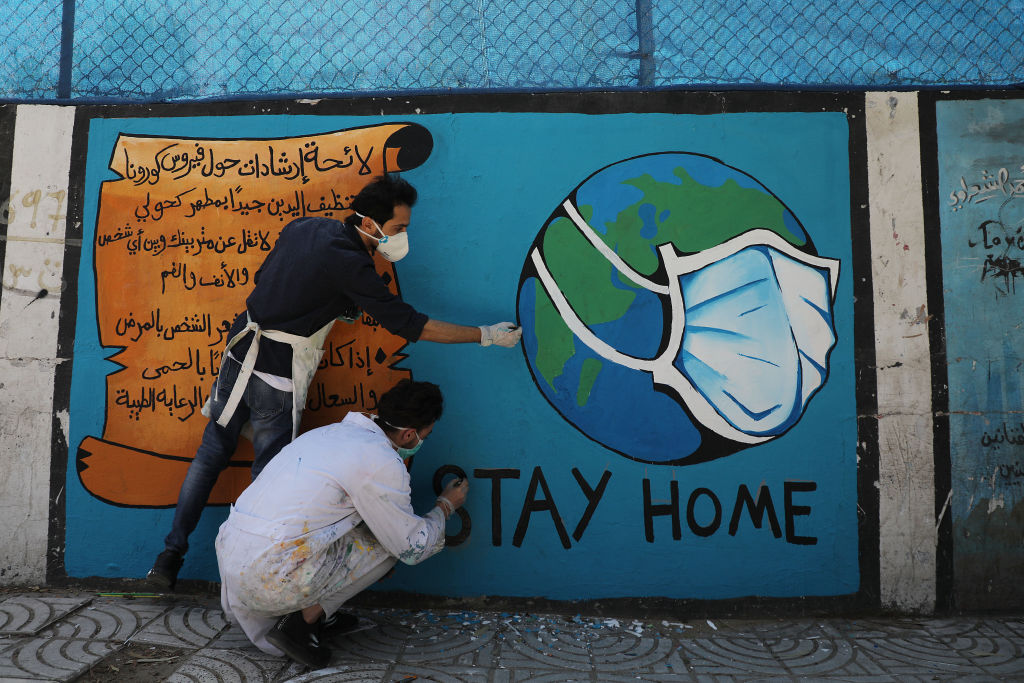Potential crises fester while world leaders focus on coronavirus

The media’s obsession with the novel coronavirus pandemic has pushed all other crises, actual and potential, out of the headlines. This does not mean they have vanished; it’s only a matter of time before one or more of them reappear with a vengeance. But there are two potential flashpoints in the Middle East that the international community cannot afford to ignore.
The most prominent of these, and one that could once again threaten war and further destabilisation of the region, is the impending Iranian nuclear crisis. Last week marked the second anniversary of America’s withdrawal from the Iranian nuclear deal. Tehran waited for a year to allow the European powers—Britain, France and Germany, who were also parties to the Joint Comprehensive Plan of Action—to convince US President Donald Trump’s administration of its folly.
When that didn’t happen, in May 2019 Iran began a calibrated series of actions to defy the limits put on its nuclear program by the JCPOA. It resumed uranium enrichment beyond the threshold permitted by the agreement and restarted research on and development of advanced centrifuges. It also expanded its stockpile of nuclear fuel, cutting in half the time it would need to produce enough weapons-grade material to build a nuclear bomb.
While these steps don’t mean that Tehran is immediately preparing to make a dash to build a nuclear weapon, they do indicate that Washington’s ‘maximum pressure’ strategy of forcing Iran through sanctions to forgo its right to enrich uranium to the level guaranteed by the JCPOA has failed.
The US expected that its sanction campaign would persuade Tehran to abandon its policy of supporting proxy actors such as Hezbollah in Lebanon and Shia militias in Iraq, as well as to curb its ballistic missile program that Washington felt threatened the security of its allies in the Middle East. The American strategy has failed to achieve these objectives as well.
Now the US has launched a move to get the UN Security Council to extend an embargo on conventional arms supply to Iran that expires on 18 October. Washington has also warned that if the Security Council fails to extend the embargo, the US, as one of the original signatories to the JCPOA, will trigger a provision of the agreement to reimpose on Iran all international sanctions, including the conventional arms embargo, that were in force before the nuclear deal was reached.
Most observers believe this move to be of dubious legality since the US has withdrawn from the deal and is no longer a party to it. Moreover, Iran has made clear that if this happens it will pull out of the JCPOA completely, expel International Atomic Energy Agency inspectors and possibly withdraw from the nuclear non-proliferation treaty altogether.
All the components of this scenario point to an eventual face-off between the US and Iran that could easily degenerate into a full-fledged war. While Trump may not be interested in engaging in a major conflict in the Middle East in an election year, the possibility of such a conflagration is likely to increase radically if he is re-elected in November.
The other potentially dangerous conflict in the Middle East may erupt over the Palestine issue. The Trump ‘peace plan’ has paved the way for Israeli annexation not only of the major Jewish settlements in the West Bank but of the Jordan Valley as well. It leaves a disconnected and unviable Palestinian entity, hemmed in by several conditional clauses, that no Palestinian is willing to buy.
The prospect of such annexations has increased with Benjamin Netanyahu’s return to power as prime minister and Benny Gantz’s abject surrender to the wily Likud leader in the coalition arrangement about to come into force.
With the two-state solution now off the table, only two options are left. The first is the collapse of the Palestinian Authority and the indefinite continuation of the Israeli occupation of the West Bank in a more direct form. The second is the eventual emergence of a bi-national state of Israel–Palestine with equal civic and political rights for all its citizens. The latter will not be acceptable to the majority of Israeli Jews and certainly not to Netanyahu’s constituency among them.
The first option is likely to eventually mutate into an apartheid state with Palestinian enclaves used as a fig leaf for ethnic domination. As the use of Bantustans in South Africa demonstrated, this is unlikely to be acceptable to the international community.
At some point, a major Palestinian revolt in reaction to the implementation of this ‘peace plan’ is likely to erupt. Unlike in 1947–48, major Arab states are unlikely to be drawn into such a conflict directly. Also unlike that time, it will not be possible for the Israeli state to expel the vast majority of Palestinians from Palestinian territories. An unconventional, asymmetric guerrilla war appears the most likely outcome if this scenario unfolds.
A Palestinian revolt is likely to find support in the Arab and Muslim worlds if not among governments then among the public, and could become a cause célèbre for Islamist terrorist groups such as al-Qaeda, Islamic State and their offshoots. If that happens, it could destabilise not only the Middle East but the world as a whole.
The Covid-19 pandemic should not be allowed to totally distract the attention of world leaders from these potentially dangerous conflicts that may erupt without much notice. Geopolitical and ethno-national conflicts don’t disappear just because there’s a major global health emergency. Their half-lives are usually longer than those of the most dangerous viruses.

